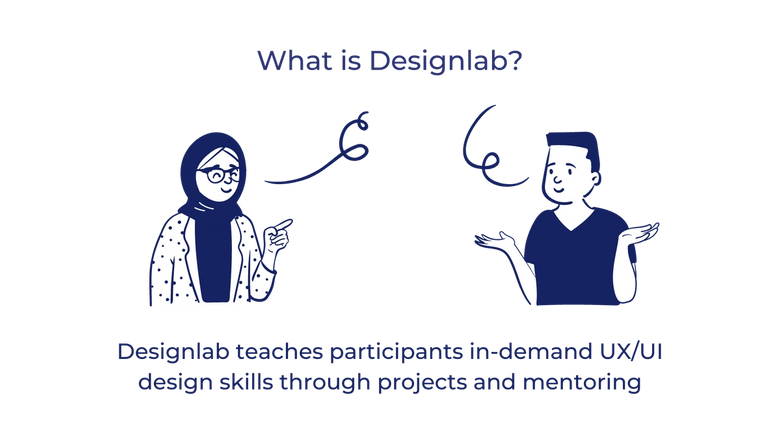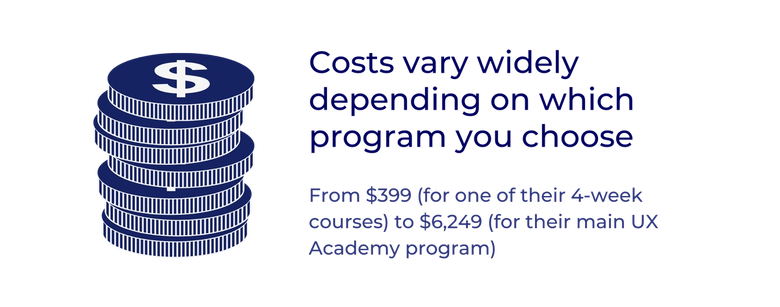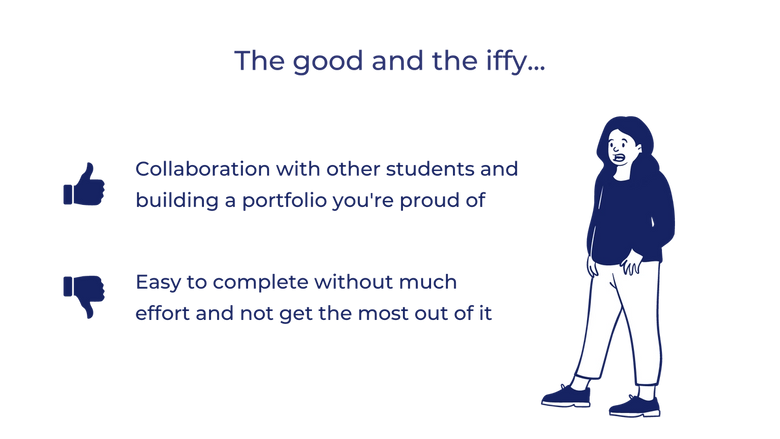What's Designlab and Can It Land You a UI/UX Job?
In this piece, we delve into the popular UI/UX bootcamp Designlab: its curriculum, cost and testimonials. But is it right for you?
UI/UX design is a fast growing field that denotes a creative career path and impactful work. However, even if you have a passion for design, it can be difficult to transition into a successful career in the UI/UX industry. This is exactly the problem that Designlab sets out to help solve.
According to its website, Designlab offers "mentor-led, online design education with a focus on quality and outcomes." One of the company's founders, Harish Venkatesan, reportedly came up with the idea for Designlab in 2012 after reading Creative Workshop, a book of design exercises. Venkatesan realized a continuous cycle of feedback and iteration was crucial for aspiring designers to improve upon their skills. Thus, Designlab was launched to "empower creators" and help teach relevant UX/UI skills so individuals could find design roles they enjoy and hone their craft.
So how does this service stack up against other design courses? We'll tell you about how it works and how to figure out if it's right for you.
How does it work?

Designlab is a UI/UX bootcamp that teaches participants in-demand UX/UI design skills through hands-on projects and 1-on-1 mentorship. Their main program is called UX Academy, which involves over 480 hours of UX design coursework and projects. According to Designlab's website, participants will complete over 100 hands-on exercises and build a portfolio with four substantial projects throughout the program. The course takes about 15 weeks to complete full-time or 28 weeks if you opt for part-time.
Upon completing UX Academy, program graduates are paired with a career coach who helps identify job opportunities, refine interview skills and ultimately assist in landing a job as UI/UX designer. According to Designlab's website, participants receive access to these career services for up to six months following conclusion of the program.
Other courses
Aspiring designers with no prior design experience will have to first enroll in Designlab's flexible UX Academy Foundations course. This prerequisite course introduces design tools (like Figma) and principles, plus basic tenants of visual design and UI design. It takes up to eight weeks to complete, requiring a minimum of 10 hours per week. After successful completion of the UX Academy Foundations course, participants can enroll in the main UX Academy course.
Designlab also offers a range of 4-week short courses that help participants learn design basics or add a specific skill to their resume. These online courses include:
- Design 101: Covers design fundamentals like idea generation, layout, typography, color theory, imagery and more.
- UX Research and Strategy: Teaches how user research can lead to stronger designs and better products. Tailored toward aspiring UX professionals, project managers and entrepreneurs.
- UI Design: Covers task flows and UI design patterns to teach participants prototyping.
- UX: Interaction Design: Teaches how to design products around user goals. Participants will sketch and wireframe their ideas using interaction patterns and usability principles.
Regardless of what program participants enroll in, they'll be paired with a hand-picked, expert mentor who will help them with fundamental UI/UX skills and provide valuable feedback. Designlab's website highlights some of their mentors which includes established professionals from companies like Walmart, Airbnb, Amazon and Grubhub.
How much does it cost?

Depending on what program you choose, costs for Designlab vary quite widely from $399 (for one of their 4-week courses) to $6,249 (for their main UX Academy program). An exact cost breakdown for each of Designlab's programs and short courses can be found below:
Primary courses...
- UX Academy Foundations: $499
- UX Academy: $6,249 (after UX Academy Foundations credit is applied)
Note: Participants who enroll in UX Academy after taking this Foundations course will receive a $500 credit toward their UX Academy tuition, meaning UX Academy Foundations is included at no additional cost.
Short courses...
- Design 101: $399 (currently discounted from $499)
- UX Research and Strategy: $399 (currently discounted from $499)
- UI Design: $399 (currently discounted from $499)
- UX: Interaction Design: $399 (currently discounted from $499)
It's important to note that Designlab does offer a tuition reimbursement guarantee if participants are unable to find a role following participation in the UX Academy program. However, in order to remain eligible for a tuition reimbursement, participants need to meet all graduation and career services guidelines which are laid out in a lengthy checklist on Designlab's website here.
What are users saying about it?

Overall, Designlab's courses come well-reviewed, with a 4.8 star rating on Course Report and 4.2 stars on Career Karma. Reviewers praise the course layout, access to amazing mentors, and help building a stellar portfolio.
Designlab itself offers many testimonials from past participants in its UX Academy program. One prominent review comes from Wendy Pei, who graduated from the first cohort of UX Academy and ended up landing a job as a Product Designer at Microsoft. Pei praised the program and said her favorite parts of the experience were working with her mentor, collaborating with other UX students and finalizing a portfolio that she took pride in.
"I loved it! It was everything that I needed in a UX bootcamp. The most crucial part for me were the capstone projects. The goal was to see if I could take at least 3 ideas from conception to prototype within 2 months. I really had to hustle, but it was worth it. The confidence I came out with really propelled me forward into the job hunt."
One Reddit user online also said they found the program to be helpful, though cautioned that participants need to fully commit to learning the coursework in order to get the most out of the program.
"I have found it really helpful, there are lots of courses and I recently completed the UX one which I found really useful. It's quite video heavy, a lot of it is just watching videos then answering questions although there is some more extensive asse[ss]ment too. It's quite easy to click through and complete the course without much effort but I found if you're willing to put the effort in and actually learn rather than just do it for the certificate, you'll get a lot more out of it. As somebody else said it's a nice thing to put on your resume but as a UX designer your portfolio is what really matters."
Is it right for me?
If you're looking to make a career jump into UX/UI or simply want to pick up some new design skills, Designlab is a viable option to consider. With 1-on-1 mentorship, extensive coursework and career services help, graduates of the UX Academy program appear to be well set up to land a UX/UI job.
However, as some reviews point out, getting a job in UX/UI often comes down to how strong your portfolio is. While Designlab does ensure program participants walk away with several "substantial" projects, it's ultimately up to the individuals to make sure their portfolios are reflecting their best efforts if they are hoping to land a coveted UX/UI job.
👉 Read Next: How to get a UX Design internship in 5 steps
The information provided herein is for general informational purposes only and is not intended to provide tax, legal, or investment advice and should not be construed as an offer to sell, a solicitation of an offer to buy, or a recommendation of any security by Candor, its employees and affiliates, or any third-party. Any expressions of opinion or assumptions are for illustrative purposes only and are subject to change without notice. Past performance is not a guarantee of future results and the opinions presented herein should not be viewed as an indicator of future performance. Investing in securities involves risk. Loss of principal is possible.
Third-party data has been obtained from sources we believe to be reliable; however, its accuracy, completeness, or reliability cannot be guaranteed. Candor does not receive compensation to promote or discuss any particular Company; however, Candor, its employees and affiliates, and/or its clients may hold positions in securities of the Companies discussed.
